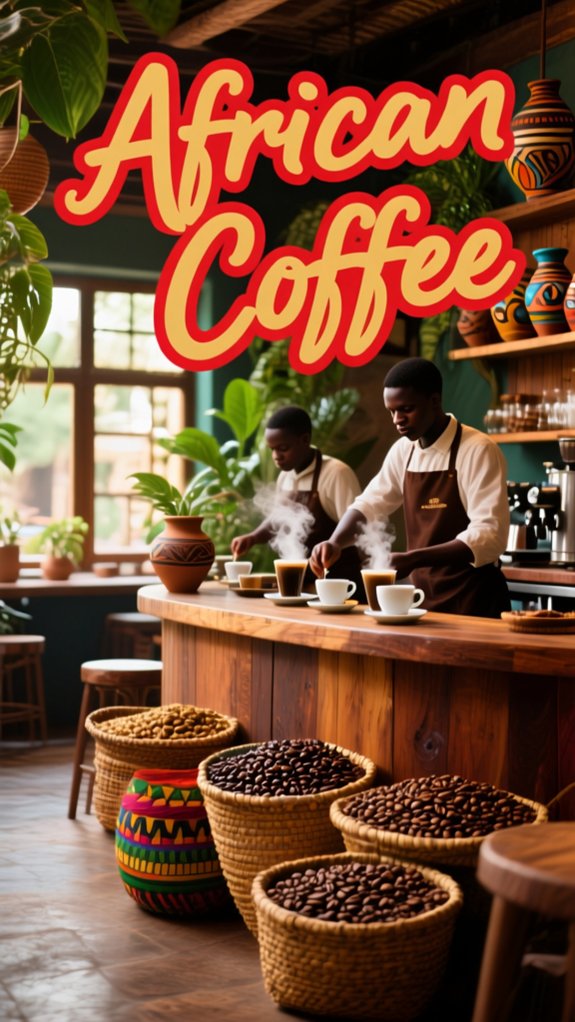Are you tired of bland, generic coffee that lacks the bold, complex flavors you crave? Many coffee lovers settle for mediocre beans without realizing that some of the world’s most extraordinary flavors come from a single continent: Africa.
African coffee offers an unmatched diversity of taste profiles, from Ethiopia’s floral, tea-like varieties to Rwanda’s honey-sweet notes and Kenya’s bright acidity. These beans grow in ideal conditions-high altitudes, volcanic soils, and perfect climates-that create flavors you simply can’t find anywhere else.
In this post, you’ll discover what makes African coffee so distinctive, explore the top regions producing these exceptional beans, and learn how to choose and brew African coffee that will completely transform your daily cup. Get ready to experience coffee the way it was meant to be.
Table of Contents
What Makes African Coffee So Unique
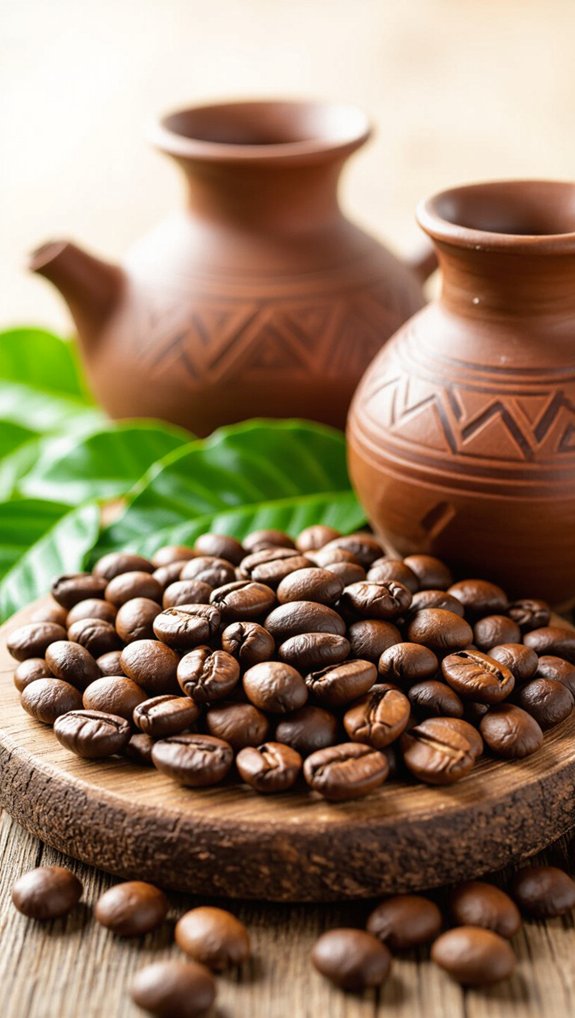
African coffee: a sensory journey that transforms your morning brew into an extraordinary experience.
When you explore African Arabica coffee, you’ll discover why it’s revered worldwide. These beans from high-altitude regions like Ethiopia’s Yirgacheffe offer complex flavor profiles that dance across your palate-think vibrant fruit notes and elegant floral undertones.
What sets African coffee apart is its incredible diversity: from Kenyan beans with bright, bold characteristics to Ethiopian varieties showcasing nuanced sweetness. Each region tells a unique story through its coffee, reflecting unique terroir, heirloom varietals, and traditional processing methods that elevate these beans from simple drink to extraordinary sensory experience.
African Coffee Producing Countries Overview
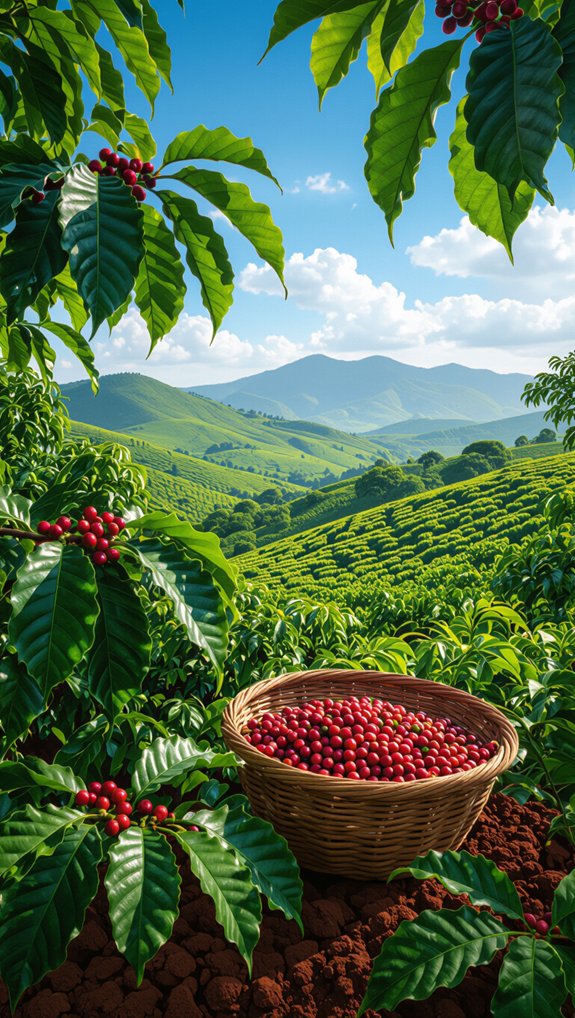
Africa’s coffee landscape is a rich tapestry of flavor, tradition, and innovation, where each country offers a unique coffee profile that reflects its terroir and cultural heritage.
From Ethiopia’s legendary birthplace of Arabica to Kenya’s bold, complex beans and Rwanda’s meticulously processed specialty lots, you’ll discover a world of extraordinary coffee experiences waiting to be explored.
I’ll guide you through the continent’s most remarkable coffee-producing regions, highlighting the distinctive characteristics that make African coffees some of the most sought-after and celebrated in the global coffee market.
Ethiopia and Coffee Origins
When you dive into the world of coffee origins, Ethiopia stands as the legendary birthplace of Arabica coffee, a region whose rich coffee heritage has shaped global coffee culture.
Here’s why Ethiopian coffee beans are extraordinary:
- Diverse regional varieties like Yirgacheffe, Sidamo, and Limmu offer unique flavor profiles
- Traditional processing methods range from natural to fully-washed techniques
- Coffees work beautifully across light-to-dark roast spectrums
Every sip tells a story of centuries-old cultivation, revealing complex fruity and floral notes that capture Ethiopia’s remarkable coffee-growing landscape.
From high-altitude farms to carefully sorted beans, these coffees represent a pinnacle of quality and cultural tradition.
Uganda’s Coffee Diversity
Step into Uganda’s vibrant coffee landscape, where two distinct coffee varieties-Robusta and Arabica-paint a rich, diverse picture of flavor and terroir.
Ugandan coffees showcase incredible range: Robusta, native to the region, thrives at lower elevations, delivering high-bodied, earthy flavors perfect for instant and espresso blends.
Arabica, grown in highland regions like Mount Elgon and the Rwenzori Mountains, offers bright, citrusy profiles that delight specialty coffee enthusiasts.
From smallholder farms to carefully processed micro-lots, Uganda’s coffee sector continues evolving, bringing unique, traceable beans to global markets with increasing recognition for quality and complexity.
Kenya’s Bold Flavors
Though Kenya isn’t the largest coffee producer in Africa, I’ll tell you why its beans are some of the most coveted worldwide. These single-origin gems offer a taste experience that sets them apart:
- Bold, bright flavors with complex acidity
- Inherent sweetness and vibrant fruit notes
- Premium Grade AA and Peaberry lots
Every Kenya Medium Roast I’ve encountered showcases incredible depth. From small farms like Nguvu and Rwaikamba, these beans deliver wine-like complexity that’ll transform your morning brew.
Whether you’re brewing pour-over or espresso, Kenyan coffees promise a sensory journey that captures the essence of East African coffee craftsmanship.
Rwanda’s Specialty Beans
Nestled in the heart of East Africa, Rwanda has emerged as a powerhouse of specialty coffee, transforming its agricultural landscape with meticulously crafted beans that tell a story of resilience and quality.
You’ll discover Rwandan specialty coffee’s vibrant profile-bright, lively flavors with citrusy and floral notes, grown on volcanic soils at high altitudes. These Fair Trade beans are carefully processed by smallholder farmers through cooperative washing stations, ensuring exceptional quality.
Light to medium roasts showcase the beans’ delicate characteristics, while the micro-lot system allows for premium, traceable single-origin offerings that coffee enthusiasts crave.
Tanzania’s Distinctive Notes
Moving from Rwanda’s volcanic terroir, Tanzania offers coffee enthusiasts another captivating African origin with distinctive flavor profiles that demand attention.
These single-origin beans deliver an exceptional experience with:
- High-elevation volcanic soil cultivation
- Bright, wine-like acidity
- Vibrant fruit-forward notes
Peaberry varieties especially shine, representing the cream of Tanzanian harvests.
Every cup reveals the region’s unique character-from light roasts highlighting crisp fruit to darker profiles emphasizing rich, complex undertones.
Specialty roasters carefully select and small-batch roast these beans, ensuring maximum freshness and flavor integrity.
Whether you’re a home barista or casual coffee lover, Tanzanian African coffees promise an extraordinary sensory journey that transforms your morning ritual.
Ivory Coast and West Africa
The coffee landscape of West Africa tells a story of resilience and adaptation, with Ivory Coast standing as a robust protagonist in the region’s agricultural narrative.
You’ll find this West African powerhouse primarily grows robusta beans in low-elevation coastal and forested areas, often intercropping coffee with cocoa.
West African coffee isn’t about specialty washes-it’s about reliable, heat-tolerant beans perfect for instant coffee and blends.
Challenges like limited processing infrastructure and aging trees have historically impacted quality.
Yet, farmers are pushing forward, introducing disease-resistant varieties and improving traceability to elevate their coffee’s global standing.
African Coffee Taste and Aroma Guide

Ever wondered what makes African coffees so uniquely captivating? These extraordinary beans offer a sensory journey that’ll delight any coffee lover:
- Ethiopian coffees burst with jasmine and bergamot, delivering complex fruity sweetness
- Kenyan beans shine with bright, wine-like acidity and bold berry notes
- Tanzanian Peaberry presents concentrated, clean cups with lively citrus undertones
Roast level dramatically transforms these profiles-lighter roasts preserve delicate floral acids, while darker roasts amplify body and chocolate notes.
The processing method also matters: washed coffees highlight bright acidity, and natural processed beans accentuate rich fermentation flavors.
Each sip tells a story of terroir, tradition, and meticulous craft.
How African Coffee Is Grown and Processed
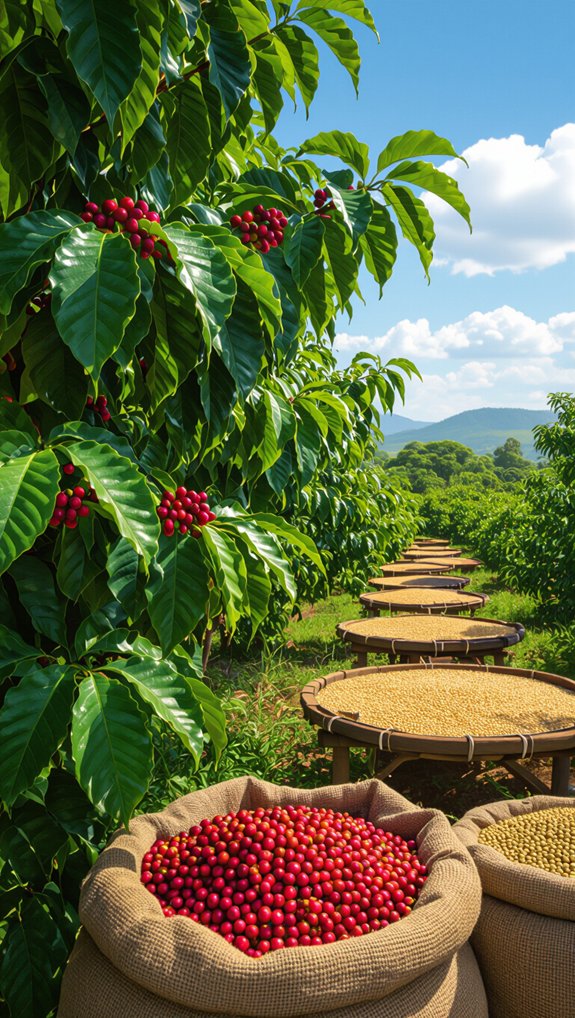
After exploring the tantalizing taste profiles of African coffees, let’s uncover the fascinating journey from seed to cup.
Ethiopian highlands and other high-altitude African regions cultivate remarkable arabica beans through meticulous growing practices. You’ll find farmers using both natural (dry) and wet processing methods, with careful hand-sorting ensuring premium quality.
Currently, Ethiopian harvests are nearly complete-about 90% finished in Yirgacheffe and Sidamo regions, with southeast zones like Jimma around 75% done. Washed arabica supplies remain constrained, commanding high prices due to limited wet mill processing.
Each bean carries the unique terroir of its origin, promising a distinctive flavor experience.
African Coffee Culture and Traditions
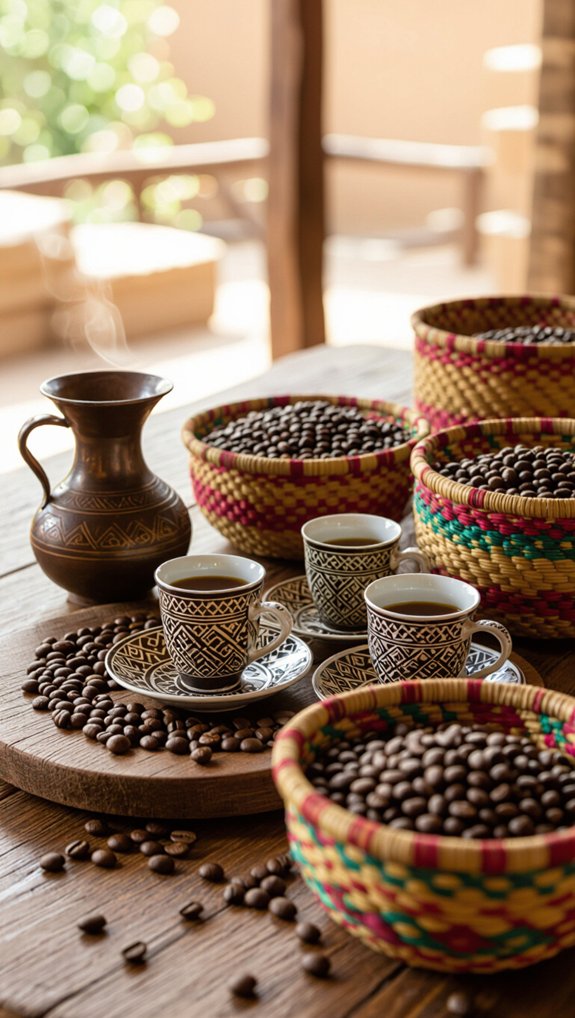
When exploring African coffee culture, you’ll discover a rich tapestry of traditions that extend far beyond mere beverage consumption.
Central to this experience are three iconic cultural practices:
- Ethiopian coffee ceremonies with ritualized roasting and brewing
- Community-driven cooperative processing in East African villages
- Traditional brewing methods that honor local terroir and heritage
From the jebena pot in Ethiopia to the carefully processed beans in Kenyan cooperatives, coffee represents more than a drink-it’s a social connector.
Each region tells its story through unique brewing techniques, showcasing how coffee isn’t just a commodity, but a living cultural expression that binds communities together through shared ritual and economic survival.
How to Choose and Brew African Coffee
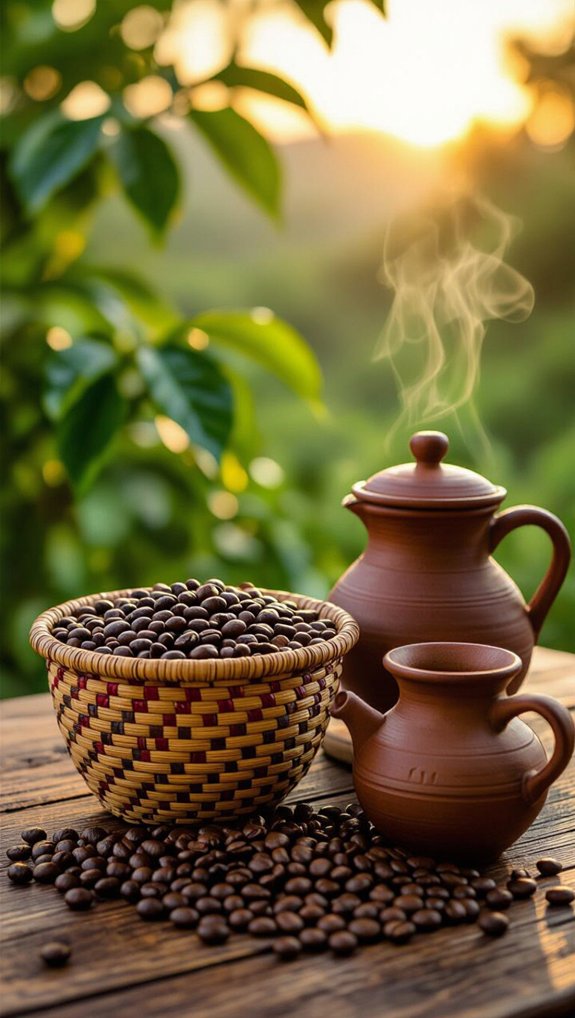
From the communal rituals of Ethiopian coffee ceremonies, we’ll now explore how to bring those incredible African coffee experiences into your own kitchen.
I recommend starting with single-origin beans like Ethiopian Yirgacheffe or Sidamo, known for their bright, fruity profiles.
Choose your roast carefully-light roasts highlight origin character, while darker roasts offer deeper, chocolatey notes.
Match your grind to your brewing method: fine for espresso, medium for drip, coarse for French press.
Always buy fresh, small-batch roasted beans and store them in an airtight container.
For the best flavor, brew using pour-over or Aeropress at 195–205°F.
Easy African Coffee Recipes to Try

I’ve always loved exploring the rich coffee traditions of Africa, and you’ll find two incredible recipes that showcase the continent’s incredible brewing styles. In Ethiopia, you’ll discover a classic coffee ceremony that transforms simple beans into a ritualistic experience, while North African countries like Morocco offer a spiced coffee that’ll warm your soul with cardamom and cinnamon.
These recipes aren’t just about brewing coffee-they’re about connecting with centuries-old cultural traditions that transform a simple drink into an art form.
Classic Ethiopian Coffee
Because Ethiopian coffee ceremonies represent one of the world’s most cherished cultural traditions, you’ll discover an incredibly rich and immersive brewing experience that transforms simple coffee preparation into a meaningful ritual.
Here’s what makes this tradition so special:
- Hand-roasting green beans on a flat pan until aromatic
- Grinding coffee manually and brewing fresh
- Serving 3–4 small, intensely flavorful cups per ceremony
You’ll want to use single-origin beans like Sidamo or Yirgacheffe, roasted light to medium. Insider tip: Add a pinch of cardamom or ginger during brewing to enhance the coffee’s natural citrus and floral notes.
The result? A deeply personal, sensory coffee experience that connects you to Ethiopian coffee culture.
Spiced North African Coffee
When exploring the rich tapestry of African coffee traditions, North African spiced coffee stands out as a vibrant and aromatic experience that transforms your daily brew into a sensory journey. You’ll discover a delightful world where dark-roasted Arabica beans dance with warming spices like cardamom and cinnamon, creating complex flavor profiles that tantalize the palate.
| Spice | Quantity | Brewing Method |
|---|---|---|
| Cardamom | 1/8 tsp | Stovetop |
| Cinnamon | Pinch | French Press |
| Cloves | Optional | Pour-Over |
| Orange Peel | 1 strip | Cold Brew |
| Nutmeg | To taste | Espresso |
Each sip tells a story of culinary tradition and sensory delight.
Best Coffee Gear for African Beans
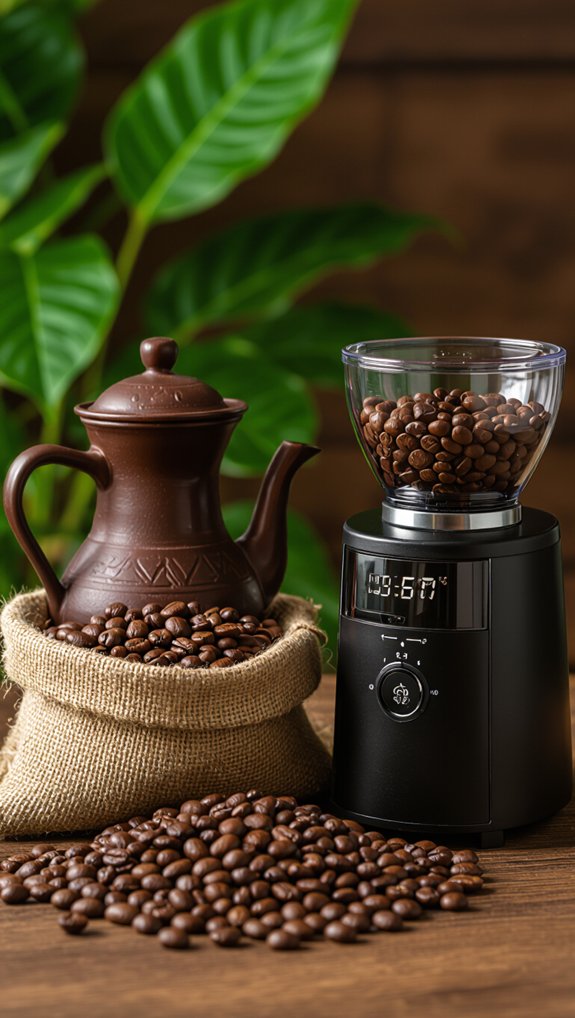
Unlock the full potential of African coffee beans by selecting the right brewing gear and techniques. Your arsenal should include:
- A precision burr grinder for consistent, method-specific grinding
- A reliable pour-over setup like V60 or Chemex
- An airtight, opaque storage container
You’ll want to invest in gear that preserves those delicate fruity and floral notes characteristic of Ethiopian and Kenyan beans. A temperature-controlled kettle helps dial in the perfect 195–205°F brew range, while a digital scale ensures precise coffee-to-water ratios.
With the right equipment, you’ll transform those vibrant African beans into a transcendent cup every time.
Where to Buy Authentic African Coffee
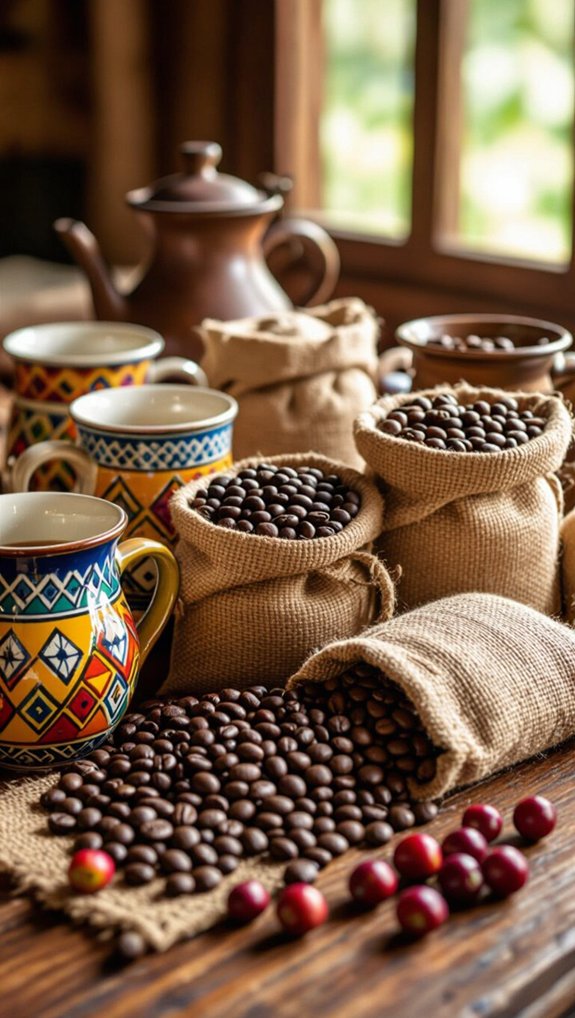
After fine-tuning your brewing technique with precision gear, you’ll want to source the most authentic African coffee beans possible.
I recommend buying directly from specialty roasters like Stone Street or Twiga, who offer single-origin beans with transparent sourcing.
Look for Ethiopian Sidamo or Kenya Nguvu with clear origin details, roast levels, and tasting notes.
Prioritize certified Fair Trade and Organic options for ethical sourcing.
Choose whole bean or ground varieties that match your brewing method, and consider subscribe-and-save programs or sampler boxes to explore different African coffee regions and flavors.
Frequently Asked Questions
What Is African Coffee?
I’ll tell you African coffee is a distinctive, high-quality coffee originating from East African countries like Ethiopia and Kenya, known for bright, complex flavors, vibrant acidity, and unique fruity or floral taste profiles.
What Is the Most Famous African Coffee?
Ethiopian Yirgacheffe is the most famous African coffee. I’ve tasted its exceptional floral and fruity notes, which have earned it widespread acclaim among coffee enthusiasts and consistently high reviews in specialty coffee markets.
What Type of Coffee Is Mainly Grown in Africa?
I mainly grow Arabica coffee across Africa, particularly in East African highlands like Ethiopia and Kenya. These regions produce specialty single-origin coffees known for their bright, fruity flavors and high-quality washed or natural processing methods.
Is Coffee Good in Africa?
Yes, Africa’s coffee is exceptional! I’ve tasted incredible beans from Ethiopia, Kenya, and Rwanda that offer unique, vibrant flavors. These single-origin coffees are renowned for their distinctive profiles, from floral to bright and complex notes.
In Conclusion
If you’re ready to elevate your coffee game, African beans are your ticket to an extraordinary brewing adventure. You’ll discover incredible flavor landscapes that transform your morning ritual from mundane to magical. From Ethiopia’s legendary Arabica to Kenya’s bright, wine-like profiles, these beans aren’t just coffee-they’re a sensory journey. Support smallholder farmers, explore unique micro-lots, and savor each carefully crafted cup.


